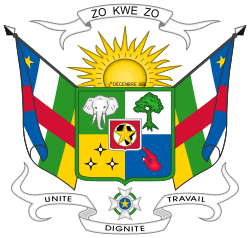1986 Central African constitutional referendum
A constitutional referendum was held in the Central African Republic on 21 November 1986, following a military coup in 1981. The new constitution would make the country a one-party state with the Central African Democratic Rally as the sole legal party. The presidential term was to be set at six years, with no term limits. Under its provisions, André Kolingba, who had led the military regime since 1981, was automatically elected as president.[1] It was approved by 92.22% of voters with an 87.6% turnout.
 |
|---|
| This article is part of a series on the politics and government of the Central African Republic |
|
|
Administrative divisions |
|
|
|
|
Following the referendum, parliamentary elections took place in July 1987.
Results
| Choice | Votes | % |
|---|---|---|
| For | 696,055 | 92.22 |
| Against | 58,752 | 7.78 |
| Invalid/blank votes | 8,644 | – |
| Total | 763,451 | 100 |
| Registered voters/turnout | 871,395 | 87.61 |
| Source: African Elections Database | ||
gollark: Not all components meaningfully have "resistance".
gollark: I'm sure you can make it work somehow.
gollark: Well, if you can do NAND, you have achieved logic.
gollark: Just allow one (1) sine wave input.
gollark: Bridging good, see.
References
- Elections in the Central African Republic African Elections Database
This article is issued from Wikipedia. The text is licensed under Creative Commons - Attribution - Sharealike. Additional terms may apply for the media files.